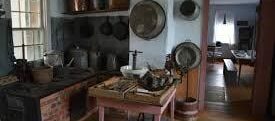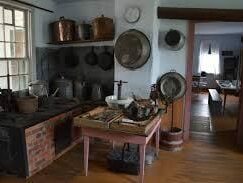Blog
The Amana Story – Part 2

AMANA'S STORY 304 YEARS IN THE MAKING – PART 2
In 1855, Metz and his followers came to Iowa and built a village. After an inspired testimony commanded the people to call their village "bleib true" or "remain faithful" the leaders chose the name Amana from the Song of Solomon 4:8. Amana means to remain true.
Five villages were built, Middle Amana, High Amana, West Amana, South Amana and East Amana. With the purchase of Homestead in 1861, the community came to own about 26,000 acres.
Farming was the principal means of support, but to meet the needs of the community and to produce goods for sale to outside markets, a calico works and two woolen mills were established, as well as craft shops, flour mills and several lumber and brick yards. These enterprises, plus the village general stores, formed the economic base for communal life in the seven Amana villages.
Day to day life revolved around worship, home, work and school (attended six days a week, year-round by the children). The community had doctors, dentists, and pharmacists to provide care to residents. Indeed everything from soap to stove wood was provided by the community.
All meals were prepared at neighborhood kitchen houses staffed by women. There were more than 50 communal kitchen houses in the seven villages feeding the 1,500 plus residents three meals daily (plus two coffee breaks). Each village had its own meat shop and smokehouse, bakery, winery and apiary, while gardens and orchards provided for all.

Personal spiritual refreshment was considered vital so residents attended worship or prayer services 11 times during the course of the week.
In 1932 because of economic pressures and dissatisfaction with the rigid communal system, Amana abandoned the communal way of life, but maintained their community. The old system was set aside and a new, profit-sharing joint stock corporation, the Amana society, was formed. The 1932 transformation known as the "Great Change" ended 89 years of communal tradition, but opened doors of opportunity for Amana's residents. The transformation, fueled by a desire to maintain the church and the need to provide more opportunities for the young people, meant that for the first time Amana community members worked for wages, owned their own homes and businesses. Following the Great Change many new businesses were established including Amana Appliances, now owned by Whirlpool.
Today the Amana Society farms the land, maintains the largest private forest reserve in the state, and operates a variety of businesses including the Amana Woolen Mill, the Amana General Store, the Amana Furniture and Clock Shop and the Amana Meat Shop and Smokehouse.
The Amana Church remains a vital part of community life with programs and serves. Visitors are welcome to Sunday worship (8:30 and 10 am.) and Wednesday prayer services (7 pm) in Middle Amana. These devotions demonstrate how the meaning of Amana – to remain faithful – is relevant today.
[from Willkommen, used with permission of Emilie Hoppe]

